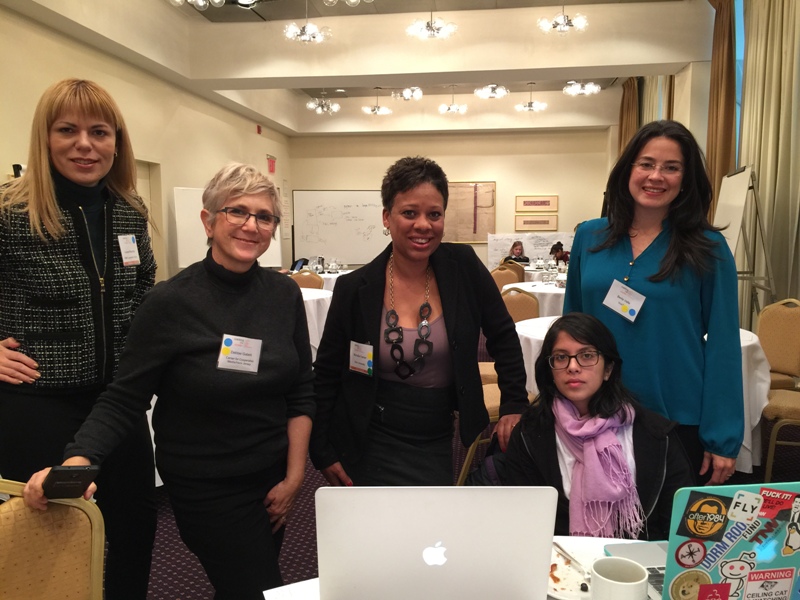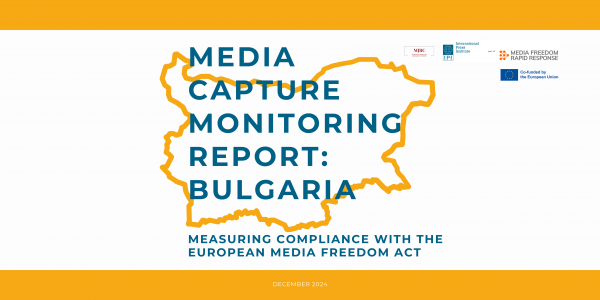Five tech-savvy media professionals and entrepreneurs are launching Trollbusters, a digital tool that aims to combat the online harassment of women.
Trollbusters impressed a panel of judges at the Cracking the Code hackathon hosted by the Ford Foundation and the International Women’s Media Foundation (IWMF) in New York on Jan. 30. Its creators walked away with $3,000 USD in Google prize money that will be used as start-up capital to get the project up and running.
“The goal was to come up with some sort of technological solution for women digital entrepreneurs who are so grossly under-represented in this space. The judges were really taken with Trollbusters, in particular, because it is obviously applicable beyond the entrepreneurship community and (it is) something that we really feel is one of the most insidious problems for women in the digital space”, said the IWMF’s executive director Elisa Lees Muñoz during an interview with Knight Mozilla Open News.
The Trollbusters team is led by Michelle Ferrier, associate dean for innovation at the Scripps College of Communication at Ohio University. Ferrier was the first female African American columnist at the Florida based Daytona Beach News Journal and was forced to quit her job and relocate to a different state after receiving a stream of racist hate mail between 2005 and 2007. Some of the most shocking messages included racist slurs and references to lynching.
Her case prompted the Committee to Protect Journalists (CPJ) to urge the US Department of Justice to carry out an investigation and take steps to guarantee her safety.
In recent years, the type of vicious letter writer that forced Ferrier out of her home has morphed into an online troll that hides behind the anonymity of a computer screen. One of the most widely publicised examples of this behaviour was the case known as Gamergate in August 2014. After American media critics Anita Sarkeesian and Brianna Wu spoke out against sexist video games, their social media accounts were flooded with rape and death threats.
“Your mutilated corpse will be on the front page of Jezebel tomorrow and there isn’t jack s**t you can do about it”, read one of the messages posted on Wu’s Twitter feed by a troll operating under the name “chatterwhiteman”.
According to research conducted by the Pew Center in 2014, four in 10 Internet users are victims of online harassment and women, in particular, have been subjected to a barrage of misogynistic abuse that has a strongly sexual component.
Trollbusters aims to tackle the problem by providing a platform where female commentators who have suffered online harassment can type in the URL of an offensive message in order to locate the troll.
Using network analysis technology developed by Ferrier’s students at the University of Ohio, Trollbusters will identify “troll nests” or communities of trolls around a given issue. The victim will also receive support from an online community that will fight back against the barrage of abuse with positive messages such as “you go girl” or “end hate speech”. “Attacks are very personal and emotional so the idea is to swarm people with love. Being able to support people at that moment is something very powerful”, Ferrier said.
As well as supporting individuals who have been targeted by trolls, the project aims to become a campaign to raise awareness of the impact of online harassment.
The team mates who worked with Ferrier to develop the prototype for Trollbusters are Sneha Inguva, co-founder of Perooz, a browser extension that enables experts to objectively refute false claims in news reports in real time; Debbie Galant, director of NJ News Commons, an effort to support and unite news organisations throughout New Jersey; Berta Valle, general manager of Vos TV in Nicaragua; and Louisa Reynolds, a freelance journalist based in Guatemala.
From now on, the project will be carried forward by Ferrier, Valle and Reynolds, as well as digital media professional Shireen Mitchell, who recently joined the team.
The IWMF has pledged to support Trollbusters by helping the team to identify prospective mentors. After winning the hackathon, its creators’ next tasks will be building a community of supporters, launching a crowd funding platform, sourcing angel investors and securing a strong technological base for the project in order to prevent attacks from hackers.
On Feb. 10, the world celebrates the 12th Safer Internet Day with the slogan “Let’s create a better Internet together”. The Trollbusters team hopes this means an Internet where female commentators can exercise their right to freedom of expression without fearing a misogynist backlash.
[Editor’s note: Reynolds told IPI in a separate conversation that the Trollbusters app utilises technology that targets specific slurs commonly associated with hate speech and sexual violence. She explained: “The main purpose of Trollbusters is to make the Internet a safer place for female commentators and ultimately for all Internet users at large by ensuring that individuals can express themselves freely without being flooded with a barrage of abusive messages. However, we are aware of the fact that when doing this we must be extremely careful not to inhibit legitimate criticism.”
Reynolds added that although the app was developed as part of a hackathon dedicated to tackling obstacles women face in the digital startup industry, “online harassment is a much wider social problem that needs to be addressed and ultimately we hope this can be a tool that can be used by anyone who has been targeted by trolls”.]
Louisa Reynolds is a 2014-2015 Elizabeth Neuffer Journalism Fellow with the International Women’s Media Foundation (IWMF). The views expressed in this article may not necessarily be those of IPI.



